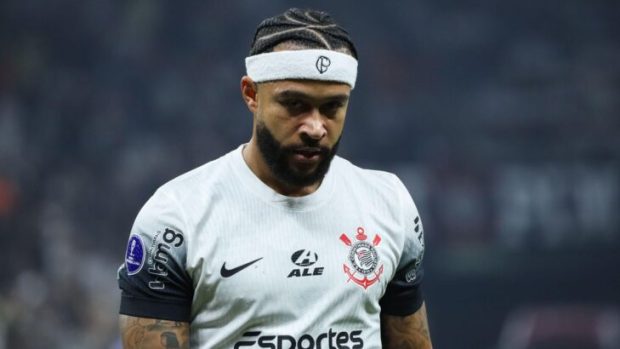If you want to know about Taiwo Awoniyi’s popularity with his Nottingham Forest team-mates, go back to the scene of his one Premier League goal this season. It was the 94th minute of a game at Wolves in January. Forest were freewheeling towards a 3-0 win and, in the grand scheme of things, Awoniyi’s stoppage-time goal did not change much.
Advertisement
Yet every one of his team-mates wanted to congratulate him. They knew how he had suffered since losing his place to Chris Wood. They knew about his luckless run with injuries. They appreciated the way he had remained a good friend and team-mate and how, despite everything, he turned up for training with a sunrise of a smile on his face.
So, yes, his team-mates were delighted for him when he put in that goal and, fleetingly, reminded everyone why he had been Forest’s leading scorer during his first season in England’s top division.
The supporters have always liked him, too, even if there have been times when he has seemed uncertain of his touch and largely unsuited to being restricted to occasional substitute appearances. Awoniyi was the club’s record signing when he joined from Union Berlin for £17.5million. He has been a big part of Forest’s brave new world since they won promotion and, for that, there is considerable affection.
So it has been a difficult, and slightly unnerving couple of days since it became apparent his collision with a goalpost during Sunday’s 2-2 draw with Leicester City had left him with internal injuries more consistent with a car crash than anything that would ordinarily be expected on a football pitch.
When Forest confirmed Awoniyi had needed an “urgent” operation because of the deterioration in his condition on Monday, they used that word because “emergency” would have sounded even more alarming. Yet both mean the same thing. If you are a football fan, you do not expect you will ever have to read about one of your team’s players being put into an induced coma, lying in a hospital’s intensive care unit, all because of his enthusiasm to score a goal for his team.
At least there was better news regarding his condition since being woken from his coma on Wednesday, according to reports, even though there has been no official update from the club. His family are with him.
Advertisement
As it is, Forest have not said anything since their last statement, released on Tuesday evening, sought to explain that the reaction of owner Evangelos Marinakis, directly after the Leicester match, was “one of deep care, responsibility and emotional investment in one of our own” rather than as it had been widely portrayed elsewhere, most notably by Gary Neville.
Scandalous from that Forest owner. Nuno should go and negotiate his exit tonight with him! The Forest fans,players and manager do not deserve that
— Gary Neville (@GNev2) May 11, 2025
Some people will choose to believe that Marinakis strode on to the pitch at full time because of almost paternal concern for seeing one of his players in obvious pain. Others will see that version of events as more of an attempt to shape the narrative in a more attractive way for the Greek shipping tycoon, bearing in mind the criticism he had encountered for his show of temper in the vicinity of manager Nuno Espirito Santo. It is a divisive issue, as it often can be with Forest.
Some will make the point that it is better to have an owner who is passionate and hands-on rather than one who seems indifferent. Others will say, fine, but it is never going to look good for someone in that position to march on the field and do what he did in front of a live TV audience.
What is beyond doubt is that Forest’s public responses have hung the club’s medical staff out to dry. And whoever you believe, or wherever you think the blame lies, that is a shame bearing in mind Tuesday’s statement referenced it being one of the club’s priorities to look after the mental wellbeing of staff.
After the game, Nuno’s explanation for Awoniyi being shown back onto the pitch after his collision was that there had been a misunderstanding and miscommunication. He was calm and measured in response to a heap of questions about Marinakis turning his anger onto him. Since then, however, there have been two different statements (one from the club, the other from Marinakis himself) that have pinned the blame on the medical staff who treated Awoniyi beside the pitch.
“The truth of the matter is that there was no confrontation (involving Marinakis) with Nuno or others, either on the pitch or inside the stadium,” read Forest’s statement. “There was only shared frustration between all of us that the medical team should never have allowed the player to continue.”
— Nottingham Forest (@NFFC) May 13, 2025
What that means for the relevant people — club doctor Prithish Shyam Narayan and head of physiotherapy Jon Alty — remains to be seen. Both are expected to be involved when Forest play at West Ham on Sunday and, within the sport, there is a certain amount of sympathy that they have been blamed so publicly without any opportunity to speak up for themselves.
Advertisement
Narayan previously worked for Leicester City, Coventry City and the Football Association, looking after England’s women’s footballers, as well as holding down senior jobs at hospitals in the Midlands. Alty’s previous roles included working for the FA with England’s national team, as well as UK Athletics, the England and Wales Cricket Board, Nottinghamshire County Cricket Club, the English Institute of Sport and EFL clubs Reading and Millwall. Alty is a popular figure behind the scenes, recognisable for his mod-style haircut, and had been credited for helping Forest improve their injury record over the past year or so.
Of course, there are legitimate questions about why Awoniyi was asked, or instructed, to return to the pitch. Who gave the signal that he was able to continue? What exactly was said? Was it misheard? Or misunderstood? Did the player indicate he was OK to carry on? And, if so, how much should that matter anyway?

(Photo: Ed Sykes/Getty Images)
Forest had just been pegged back to 2-2 in a game that, realistically, they needed to win to maintain their hopes of Champions League qualification. Nursing a broken, vulnerable body, he spent another eight minutes on the pitch, barely able to walk, let alone run. It cannot have helped.
Behind the scenes at Forest, it has been described as a miracle that the Nigerian could remain on his feet once he had re-entered the pitch. And, though it is easy to be wise after the event, maybe that was the time for somebody to intervene. Once the mistake was obvious — and it was glaringly obvious to everyone that he was in no fit condition to challenge the opposition defence — surely he could have been removed, even if it meant Forest going down to 10 men?
Or were Nuno and his coaching staff clinging to the belief, perhaps, that it was something Awoniyi could just run off? Because we all wondered at first if he had simply been winded, or taken a bang to the ribs, rather than the serious injury it turned out to be.
The entire drama might have been avoided if the assistant referee had raised a ‘late flag’ to halt Forest’s attack and, before anything else, perhaps the relevant authorities should look closely at the way that rule works, enabling play to continue and then being brought back even when the offside is blindingly obvious. The sport, as a whole, had been warned that an injury could happen after the regulation change in 2020-21, and that has been proven in the most terrible way.
Unfortunately for Forest’s No 9, it is also just a basic fact that internal injuries are harder to diagnose than, say, a broken bone or a concussion. One EFL physio, speaking on the grounds of anonymity to protect working relationships, told The Athletic it would be “nigh on impossible” to detect an internal abdominal injury in the time Awoniyi received medical care.
This news was originally published on this post .







Be the first to leave a comment